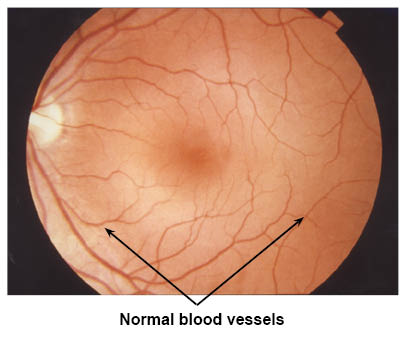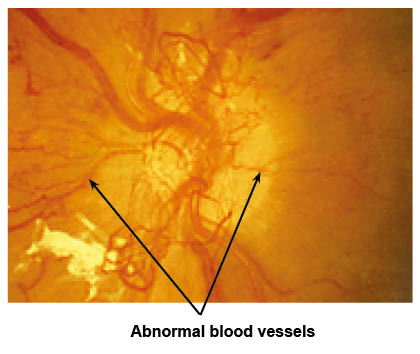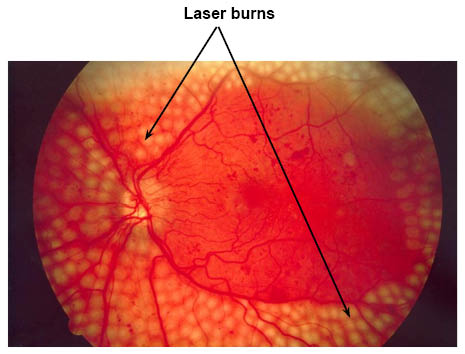Pan Retinal Photocoagulation (PRP) for Proliferative Diabetic Retinopathy
Information for patients from Ophthalmology
This leaflet is for patients diagnosed with Proliferative Diabetic Retinopathy, who need laser treatment. It will guide you through your appointment, explaining how to prepare and how you may feel after your treatment.
What and where is the retina?
.jpg)
The retina is a light-sensitive layer of tissue at the back of the eye. It converts light into electrical signals, sends these signals to the brain, and interprets them as recognisable images.
What is a Proliferative Diabetic Retinopathy (PDR)?
Diabetic retinopathy is a complication of diabetes. It is caused by high blood sugar levels damaging the blood vessels at the back of the eye (retina). It can cause blindness if left undiagnosed and untreated.
In PDR, the blood vessels that nourish the retina are blocked, triggering growth (proliferation) of new abnormal blood vessels, which are thin and weak. These abnormal vessels can bleed into the retina and vitreous (the clear watery gel that fills the eye), causing loss of vision.
In the advanced stages of PDR, new blood vessels and scar tissue can lead to retinal detachment. This is where the retina pulls away from the back of the eye. If this happens, there is a high risk that you will lose your vision.
-
 Normal blood vessels in the eye.
Normal blood vessels in the eye. -
 Abnormal blood vessels in the eye. Image source: Early Treatment of Diabetic Retinopathy Study (ETDRS) research group.
Abnormal blood vessels in the eye. Image source: Early Treatment of Diabetic Retinopathy Study (ETDRS) research group.
How is Proliferative Diabetic Retinopathy found?
Most patients do not have any symptoms, with no change to their eyesight. Often the changes are only found when you have your regular eye examination or a scan that shows the back of your eye (the retina).
Your optician can offer you a retinal examination. However, if you are diagnosed with this condition you must also go to your diabetic eye screening appointment, which will be at the hospital or a community clinic. At this appointment, pictures are taken of the back of your eyes to check for any changes. Following this appointment, the specialist team will assess the photos of your eyes.
We advise you to go to all the appointments you are offered.
How does Pan Retinal Photocoagulation (PRP) work?

Pan Retinal Photocoagulation (PRP) laser is used to treat PDR.
The treatment aims to shrink the growth of abnormal blood vessels on the retina.
PRP cannot restore (bring back) vision loss, but it can stop further loss. It does this by slowing down the growth of the abnormal new blood vessels.
Multiple laser burns are applied in one session.
The procedure takes around 30 minutes.
The procedure can be uncomfortable but it should not be painful.
Can I drive myself to hospital?
Do not drive home or use a mobility scooter after your procedure. Your vision may be blurred from the eye drops for several hours after your procedure, and you may feel “dazzled” by the laser light. You should arrange for someone to collect you after your treatment or make suitable transport arrangements. If you need help with this, please speak to a member of staff before your appointment date.
How do I prepare for my PRP procedure?
Bring sunglasses with you for your comfort, to help with glare after your treatment.
Bring distance glasses or contact lenses to your appointment, if you have them.
Allow two hours for your appointment. Occasionally you may need longer than this, but it is unlikely.
Diabetic patients should make sure they bring enough food and medication to the hospital.
Please take all your regular medications before this treatment.
What happens at my appointment?
Your appointment letter will tell you the time and date of your procedure.
The procedure will be carried out in the Ophthalmology Outpatients Department; you will not need to stay in hospital overnight.
You will have the procedure explained before treatment begins. Please use this time to ask any further questions. Remember you can withdraw your consent for treatment at any time.
At your appointment
You may have a vision test, so please bring your distance glasses with you.
If you wear contact lenses, please be prepared to remove them for your appointment.
You will be given drops in one or both of your eyes, to enlarge your pupils. This will blur your vision for several hours, but it should not be painful.
You will be asked to sign a consent form saying that you understand the risks and benefits of the procedure. Please use this time to ask any questions. Remember you can withdraw your consent for treatment at any time.
An anaesthetic drop will be put in your eye to numb it. Your doctor will then place a contact lens on the surface of your eye to focus the laser beam and keep your eye open.
The procedure usually takes 30 minutes. During this time you will hear beeping noises and see bright lights.
If you feel extreme discomfort or feel unwell at any stage, tell the doctor and they will stop the procedure.
Following your treatment, you can go home as soon as you feel ready.
To start with, your vision may seem darker after your treatment, but this only lasts for 24 to 48 hours.
You may feel discomfort or a dull ache in your eye after your laser treatment. This can be helped by taking simple painkillers, such as paracetamol.
Are there any risks / side effects of PRP laser treatment?
Occasionally your eye can develop bleeding, as the blood vessels shrink.
Rarely your vision may be worse after the treatment; this can be permanent. This can be caused by a build-up of fluid at the back of your eye (macular oedema), bleeding within the eye (vitreous haemorrhage), or an unintended burn to the centre of your retina.
Your eye may be left with the following long-term effects.
Your vision may take longer to adjust to and from bright and dark conditions.
Your vision may be more sensitive to very bright light.
You may not be able to see as well at night.
Your colour vision may change.
Peripheral (around the edge) vision may get worse.
Very rarely, you may develop significant loss of central vision, which may be permanent.
Sometimes laser treatment does not work, and your vision can still get worse despite treatment.
You will discuss the above with your doctor before your treatment. If you have any worries or concerns, please speak to them before your procedure.
Can I drive after laser treatment?
Do not drive home, use a mobility scooter, or operate machinery for 24 hours after your treatment. Your vision may be blurred from the eye drops for several hours after your procedure, and you may feel “dazzled” by the laser light. You should arrange for someone to collect you after your treatment or make suitable transport arrangements. If you need help with this, please speak to a member of staff before your appointment date.
You are legally responsible for telling the DVLA if you have retinopathy or have had treatment for it (such as laser treatment).
How do I look after my eye at home?
Your doctor will tell you if you need to use eye drops after your treatment, and if there is anything you need to avoid.
Continue to take / use your normal medication, unless you are told otherwise by your doctor.
Will I need a follow-up appointment?
Yes. A follow-up appointment will be arranged to check if your eye has responded to treatment, or if a further session of PRP treatment is needed.
What should I do if I feel unwell at home?
If you have any concerns once you get home, please phone William Harvey Hospital on 01233 633331 and ask for the on-call ophthalmologist.
Further information
DVLA: check if a health condition affects your driving
For advice on requirements for notifying the DVLA. Select the Retinopathy (with laser treatment) option.Royal National Institute of Blind People (RNIB): eye conditions